7 books for 2019
2018 was a good year for crossing off books on my “to read list”. Today after Holy Mass, I began thinking of the books I wanted to read for 2019 and decided to make a list so I could keep the momentum going.
A Few Tricks:
Here are a few things I did in 2018 that helped me read more books than I have in the past.
- Have multiple books going at once – I noticed I have little pockets of 10-15 minutes throughout the day where I could either check social media or pick up a book. Instead of carrying one book around with me all the time, I leave 1 book in my truck, 1 in my office, and another at home. This way regardless of where I am or what I am doing, I have a book close by. I know many don’t like having more than 1 book going at a time but it helped me maximize opportunities to read.
- Don’t feel obligated to finish – I think I got this advice from Brandon Vogt in one of his emails and it may be the best advice I have received regarding how to read more books. I used to grind through books I didn’t enjoy because I felt obligated to finish it. This only made me not want to read and when I did, I wasn’t enjoying it. This year I know I put down at least 4 books after reading portions of it and realizing either A.) I got the information out of the book needed or B.) it wasn’t what I really wanted to read. Had I of tried to grit my way through, I wouldn’t have finished reading as many books as I did.
- Audiobooks – I only listen to podcasts and audiobooks these days. A couple times a year I have to travel 8+ hours on the road. I found out I could crank through a whole book in about 8 hours. I think I finished 6 audiobooks alone last year. ***I did find theology and philosophy books weren’t easy for me to listen to. For me, biographies, history, business, and/or policital books were the way to go for audiobooks***
- T.V. – Cutting the cable and not mindlessly watching T.V.
- Read with your wife – We pick out a book and read it out loud together. It’s fun and it is quality time with your spouse.
The List:
Note: I try to always read True Devotion to Mary and Ways of Mental Prayer every year so I didn’t add them to this list. I also only chose 7 to give me the flexibility to add to the list as the year goes on.
12 Steps to Holiness and Salvation from the works of St. Alphonsus Liguori
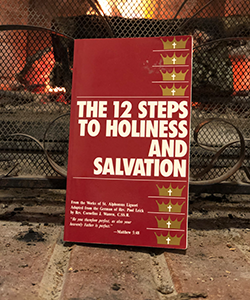
St. Alphonsus wrote numerous books, including his Moral Theology; of his many excellent devotional works, the masterpiece entitled The Glories of Mary is the most famous. St. Alphonsus died in 1787, within two months of his 91st birthday. He was canonized in 1839, and in 1871 Pope Pius IX declared him a Doctor of the Church.
This present volume is made up of choice selections from the various ascetical writings of the saint. The order of virtues considered is that followed by the spiritual sons of St. Alphonsus in the Congregation of the Most Holy Redeemer. For each month of the year is assigned a particular virtue to which they are to devote their attention. This is a practice highly recommended by the masters of the spiritual life and is fraught with the happiest results. The 12 steps are: Faith, Hope, Love of God, Love for Our Neighbor, Poverty, Chastity, Obedience, Meekness and Humility, Mortification, Recollection, Prayer, and Self-Denial and Love of the Cross.
The Life of the World to Come by Abbot Vonier
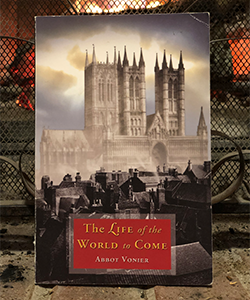 The 1920’s were full of great Catholic writers – Chesterton, Knox, and Belloc. Although largely forgotten today, Abbot Vonier was a gifted theologian, author, and preacher in England during the inter-War years. He wrote a great book called, A Key to the Doctrine of the Eucharist, that he is probably best known for, however, The Life of the World to Come, talks about something we all want to know more about —– HEAVEN!
The 1920’s were full of great Catholic writers – Chesterton, Knox, and Belloc. Although largely forgotten today, Abbot Vonier was a gifted theologian, author, and preacher in England during the inter-War years. He wrote a great book called, A Key to the Doctrine of the Eucharist, that he is probably best known for, however, The Life of the World to Come, talks about something we all want to know more about —– HEAVEN!
We all want to go to Heaven — but what will Heaven actually be like? Drawing on sacred Scripture and Catholic doctrine, The Life of the World to Come pulls back the veil to give us a closer look at the dazzling joys, the reality of eternal life. With simplicity and good humor, this book opens the eyes of men and women to splendors of the Catholic faith.
Leisure: The Basis of Culture by Josef Pieper
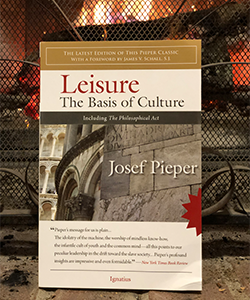 While doing research for the episode we did on ‘Leisure‘, we kept asking for suggestions on who we should reseach regarding this topic. Over and over again the only answer we received was Leisure: The Basis of Culture by Josef Pieper. I didn’t have the opportunity to read the whole book but only read segments and after finishing his book, The Four Cardinal Virtues (highly recommended), I figured I need to sit down and finish this book.
While doing research for the episode we did on ‘Leisure‘, we kept asking for suggestions on who we should reseach regarding this topic. Over and over again the only answer we received was Leisure: The Basis of Culture by Josef Pieper. I didn’t have the opportunity to read the whole book but only read segments and after finishing his book, The Four Cardinal Virtues (highly recommended), I figured I need to sit down and finish this book.
One of the most important philosophy titles published in the twentieth century, Josef Pieper’s Leisure, the Basis of Culture is more significant, even more crucial, today than it was when it first appeared more than fifty years ago. This edition also includes his work The Philosophical Act. Leisure is an attitude of the mind and a condition of the soul that fosters a capacity to perceive the reality of the world. Pieper shows that the Greeks and medieval Europeans, understood the great value and importance of leisure. He also points out that religion can be born only in leisure — a leisure that allows time for the contemplation of the nature of God. Leisure has been, and always will be, the first foundation of any culture. Pieper maintains that our bourgeois world of total labor has vanquished leisure, and issues a startling warning: Unless we regain the art of silence and insight, the ability for non-activity, unless we substitute true leisure for our hectic amusements, we will destroy our culture — and ourselves.
The Spiritual Doctrine of Father Louis Lallemant
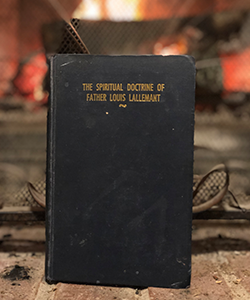 Confession time: I have actually already started this book. I am about 50 pages in, but it’s only because I have started this book that I’m being able to add it to the list and tell you how excited I am I found this at a used bookstore. The book is broken up into 7 “principles” 1. The Consideration of the End 2. The Idea of perfection. 3. Purity of Heat 4. Of the Guidance of the Holy Spirit, and Docility Thereto 5. Recollection and the Interior Life 6. Union with Our Lord 7. The Order and Degrees of the Spiritual Life. You can read it free online here. Fr. Lallemant has been called the Balthazar Alvarez of France, and not without reason. His ideas were no less heroic and his efforts after them as uncompromising as those of that great master of spiritual life. Like him also, he expected from others what he did himself. He set, therefore, the highest ideals before his disciples, especially the Fathers of the third probation, and required them to rise to such ideals. Moreover, as Father Balthazar Alvarez may be held to have contributed not a little, through the great masters of spiritual life he formed, to fix that special type of spirituality which characterized the Spanish Jesuits, so to Father Lallemant’s teaching may be traced in no small measure the specific spirituality of the French Jesuits, which the eminent men who came under his teaching and formation diffused throughout the French provinces. He is known today chiefly by his “Doctrine Spirituelle”, a collection of his maxims and instructions gathered together by Father Jean Rigoleuc, one of his disciples, and detailing very thoroughly his spiritual method.
Confession time: I have actually already started this book. I am about 50 pages in, but it’s only because I have started this book that I’m being able to add it to the list and tell you how excited I am I found this at a used bookstore. The book is broken up into 7 “principles” 1. The Consideration of the End 2. The Idea of perfection. 3. Purity of Heat 4. Of the Guidance of the Holy Spirit, and Docility Thereto 5. Recollection and the Interior Life 6. Union with Our Lord 7. The Order and Degrees of the Spiritual Life. You can read it free online here. Fr. Lallemant has been called the Balthazar Alvarez of France, and not without reason. His ideas were no less heroic and his efforts after them as uncompromising as those of that great master of spiritual life. Like him also, he expected from others what he did himself. He set, therefore, the highest ideals before his disciples, especially the Fathers of the third probation, and required them to rise to such ideals. Moreover, as Father Balthazar Alvarez may be held to have contributed not a little, through the great masters of spiritual life he formed, to fix that special type of spirituality which characterized the Spanish Jesuits, so to Father Lallemant’s teaching may be traced in no small measure the specific spirituality of the French Jesuits, which the eminent men who came under his teaching and formation diffused throughout the French provinces. He is known today chiefly by his “Doctrine Spirituelle”, a collection of his maxims and instructions gathered together by Father Jean Rigoleuc, one of his disciples, and detailing very thoroughly his spiritual method.
The Way of Perfection by St. Teresa of Avila
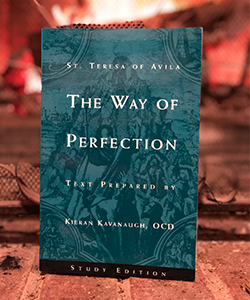 This is the one that will be the toughest to complete. The book itself is intimidating at over 500 pages. I have read St. Teresa’s The Way of Prayer and loved it but have been hesitant to jump fully into this book. It’s been on my list for a while and 2019 will be the year to check it off the list. In The Way of Perfection, St. Teresa gives practical counsels and advice on prayer, destined originally for the nuns who embraced the reformed Carmelite life she established. As a handbook for spiritual formation, it presented them with the basic Christian spirituality undergirding their Constitutions and Rule.
This is the one that will be the toughest to complete. The book itself is intimidating at over 500 pages. I have read St. Teresa’s The Way of Prayer and loved it but have been hesitant to jump fully into this book. It’s been on my list for a while and 2019 will be the year to check it off the list. In The Way of Perfection, St. Teresa gives practical counsels and advice on prayer, destined originally for the nuns who embraced the reformed Carmelite life she established. As a handbook for spiritual formation, it presented them with the basic Christian spirituality undergirding their Constitutions and Rule.
The principles and teachings in Teresa’s book clearly lend themselves to broader applications, and can work well in all walks of life.
This study edition—with its introduction, commentary, notes, discussion questions, and glossary—provides what is needed to assist contemporary readers in making these applications and delving more deeply into the text’s spiritual riches.
Saint Thomas Aquinas: A Biographical Study by Father Angelus Walz, O.P.
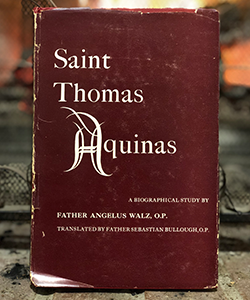 Another used bookstore find! Saint Thomas Aquinas, one of the most gifted of thinkers, was the chief exponent of Scholastic Philosophy, which is fundamentally that of Aristotle. The Angelic Doctor adopted this philosophy and brought it into perfect harmony with Christian belief. His works on theology and philosophy are voluminous, but his reputation rests mainly on his Summa Theologica (which is plan on buying this year as well), a treatment of the whole of Catholic Dogma. The present biographical study is the latest critical and synthetic presentation of the whole life of Aquinas. It was completed in 1945 by the distinguished historian, Angelus Walz, of the Dominican Order, who taught at the Angelicum in Rome. Fr. Walz does not set out merely to tell the story nor only to estimate Aquinas’ character (though both are excellently done), but primarily to present a scholarly documentation of Aquinas’ life which disentangles the chronological problems and biographical uncertainties. The author sifts facts from fiction, records the evidence of the early sources, and weighs the conclusions of later historians and biographers. A special study is also made of the Holy Doctor’s contemporaries and acquaintances. The concludes with a complete list of St. Thomas’ works and a brief survey of Thomistic literature.
Another used bookstore find! Saint Thomas Aquinas, one of the most gifted of thinkers, was the chief exponent of Scholastic Philosophy, which is fundamentally that of Aristotle. The Angelic Doctor adopted this philosophy and brought it into perfect harmony with Christian belief. His works on theology and philosophy are voluminous, but his reputation rests mainly on his Summa Theologica (which is plan on buying this year as well), a treatment of the whole of Catholic Dogma. The present biographical study is the latest critical and synthetic presentation of the whole life of Aquinas. It was completed in 1945 by the distinguished historian, Angelus Walz, of the Dominican Order, who taught at the Angelicum in Rome. Fr. Walz does not set out merely to tell the story nor only to estimate Aquinas’ character (though both are excellently done), but primarily to present a scholarly documentation of Aquinas’ life which disentangles the chronological problems and biographical uncertainties. The author sifts facts from fiction, records the evidence of the early sources, and weighs the conclusions of later historians and biographers. A special study is also made of the Holy Doctor’s contemporaries and acquaintances. The concludes with a complete list of St. Thomas’ works and a brief survey of Thomistic literature.
The Morality of the Exterior Act by Fr. Chad Ripperger, PhD
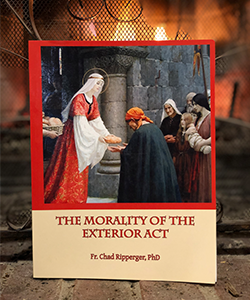 Fr. Ripperger is a leading expert in the areas of Thomistic philosophy, moral theology, spiritual warfare, and exorcism. His education and first hand experience make his books and talks highly informative and interesting. He always provides a plentitude of insights into the Catholic faith and traditions that give any reader/listener an abundance of information on which to meditate. This text addressed how we know what we are doing morally. It includes a discussion by St. Thomas and other moralists regarding the nature of the object of the moral act, the distinction between a natural and moral species of an act and how one goes from the natural species of an act to the moral species of the act as conceived by reason. The text also includes a detailed discussion of circumstances as well as the fundamental option.
Fr. Ripperger is a leading expert in the areas of Thomistic philosophy, moral theology, spiritual warfare, and exorcism. His education and first hand experience make his books and talks highly informative and interesting. He always provides a plentitude of insights into the Catholic faith and traditions that give any reader/listener an abundance of information on which to meditate. This text addressed how we know what we are doing morally. It includes a discussion by St. Thomas and other moralists regarding the nature of the object of the moral act, the distinction between a natural and moral species of an act and how one goes from the natural species of an act to the moral species of the act as conceived by reason. The text also includes a detailed discussion of circumstances as well as the fundamental option.
BONUS:
Arcanum Divinae Sapientiae On Christian Marriage by Pope Leo XIII
I’m trying my best to read more Church documents. I have done a good job of reading all the encyclicals that have been released in recent history but the Church has given us so much beauty and wisdom throughout Her history to tap into and study. Anything by Pope St. Leo XIII is going to be great.
What does your list look like? Have you read any of the books listed above? Let us know what you think!
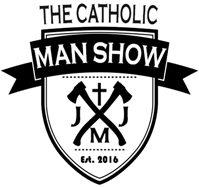
Adam, amazing list. I am currently reading history and heroes of a spiritual weapon by Donald Calloway MIC. It is a great read on the power of the rosary.
Through Mary to Jesus, (now that is power)
All new ones to me. Wow I feel under read. Also my wife and I kept a running tally last year one how many books we read. That way we had a little competition and had a visual of how well we were doing throughout the year. Goal this year is to do as many as last year +1.
Happy Holy Reading Everyone!